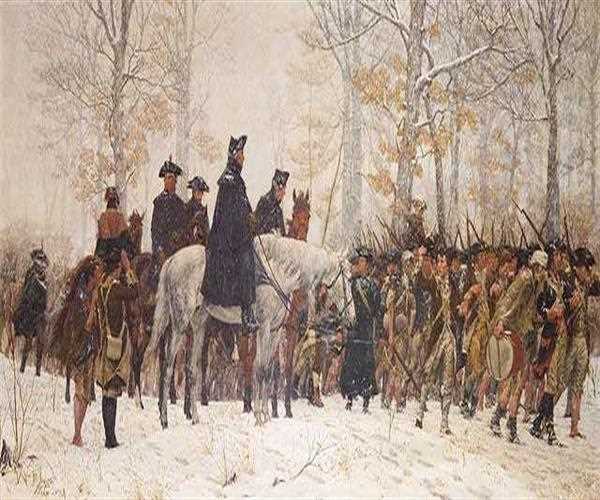American spirits achieved a low point amid the cruel winter of 1777-78. British troops had walked triumphantly into Philadelphia the past harvest time. Philadelphia was the biggest city in the Colonies and the seat of political power. After the British cleared into Philadelphia, the Continental Congress had escaped to the west, first to Lancaster at that point to York.

Valley Forge
Washington's armed force had spent the mid-year of 1777 battling a string of losing fights. The Americans hassled the British armed force in conflicts and minor fights for a great part of the battling season. In the fall, the Americans demonstrated cull at the Battle of Brandywine in September and the Battle of Germantown in October. However, the Americans were not able to keep the British out of Philadelphia.
In December, Washington walked his worn out, beaten, ravenous and wiped out an armed force to Valley Forge, an area around 20 miles northwest of British-involved Philadelphia. From Valley Forge, Washington could watch out for General Howe's British armed force tucked away in Philadelphia.
At Valley Forge, there were deficiencies of everything from sustenance to dress to pharmaceutical. Washington's men were wiped out from infection, appetite, and introduction. The Continental Army stayed outdoors in rough log lodges and persevered through cool conditions while the Redcoats warmed themselves in provincial homes. The nationalists went hungry while the British warriors ate well.
Tours of duty were finishing for some warriors in Washington's armed force.
The General thought about whether he would even have an armed force left when the spring defrosts at last arrived. General Washington was disturbed that nearby ranchers were storing genuinely necessary nourishment holding up to gain higher benefits in the spring. A few ranchers even sneaked grain into Philadelphia to sustain the British armed force, who paid in gold or silver. With each passing night came more abandonment. Washington became secretly sickened at the absence of responsibility for his alleged loyalist warriors.
At that point, there was the protesting of some in Congress and among Washington's very own portion officers. Washington's authority aptitudes were transparently addressed. Numerous said General Horatio Gates was more qualified to driving the armed force. All things considered, hadn't he scored a noteworthy triumph in October at the clash of Saratoga.? Inside the earth of cool, hardship, and resistance, to what extent could Washington and his armed force persevere?
Help came as a Prussian volunteer, Baron von Steuben. The military pioneer was alarmed at the absence of American train. At Washington's asking, he prepared the Continental Army, Prussian-style. The troops gradually turned out to be more expert. Among the officers who remained, certainty developed.
Through the span of the winter, the climate enhanced to some degree. Nourishment streamed in from the encompassing field. Numerous spouses of fighters invested energy at Valley Forge over the winter. Washington could subdue the individuals who scrutinized his authority capacities.
The Continental Army stayed at Valley Forge in the fall of 1777 with around 12,000 men in its positions. Passing asserted about a fourth of them before spring arrived. Another thousand didn't reenlist or abandoned. Be that as it may, the armed force that remained was more grounded. They were less, yet more trained. They were fatigued, yet immovably settled.
The following year, 1778, conveyed more prominent fortune to the American reason. While Washington solidified at Valley Forge, Benjamin Franklin was occupied with anchoring the French organization together. Presently the war would be diverse without a doubt.